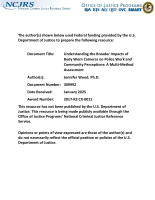Use of force
Police de-escalation training and its effects on communication: Evidence from an experimental evaluation
Lead by Example: The Effects of Police Supervisors on Officer Behavior
Improving Officer Decision-Making: Can Personality Predict Outcomes in Use of Force Decisions?
The Impact of a Brief and Immersive Use-of-force Training Exercise on Citizens' Attitudes Toward Police
Examining the Effect of Warrior and Guardian Mindsets on Attitudes Toward Use of Force: An Analysis of US Police Recruits
Deadly Force - Crime File Series Study Guide
Police Pursuit and the Use of Force
Pepper Spray Evaluation Project: Results of the Introduction of Oleoresin Capsicum (OC) Into the Baltimore, Maryland, Police Department Final Report
Role of Police Psychology in Controlling Excessive Force
POLICE USE OF FORCE: OFFICIAL REPORTS, CITIZEN COMPLAINTS, AND LEGAL CONSEQUENCES VOLUMES I AND II
And Justice for All: Understanding and Controlling Police Abuse of Force
RESOLUTION OF PRISON RIOTS
Understanding the Broader Impacts of Body Worn Cameras on Police Work and Community Perceptions: A Multi-Method Assessment
Infusing Evidence into Police Reform: Field Initiated Action Research with the Louisville Metro Police Department
An Experimental Test of the Contagious Fire Thesis in Policing
Celebrating 10 Years of NIJ’s Law Enforcement Advancing Data and Science (LEADS) Scholars Program - 2024 NIJ Research Conference
In 2014, NIJ established the Law Enforcement Advancing Data and Science (LEADS) Scholars Program to support research-minded, mid-career sworn law enforcement officers working to integrate research into agency policy and practice. The LEADS Scholars Program helps participants develop independent research and provides support to identify current evidence on priority issues.
See the YouTube Terms of Service and Google Privacy Policy



